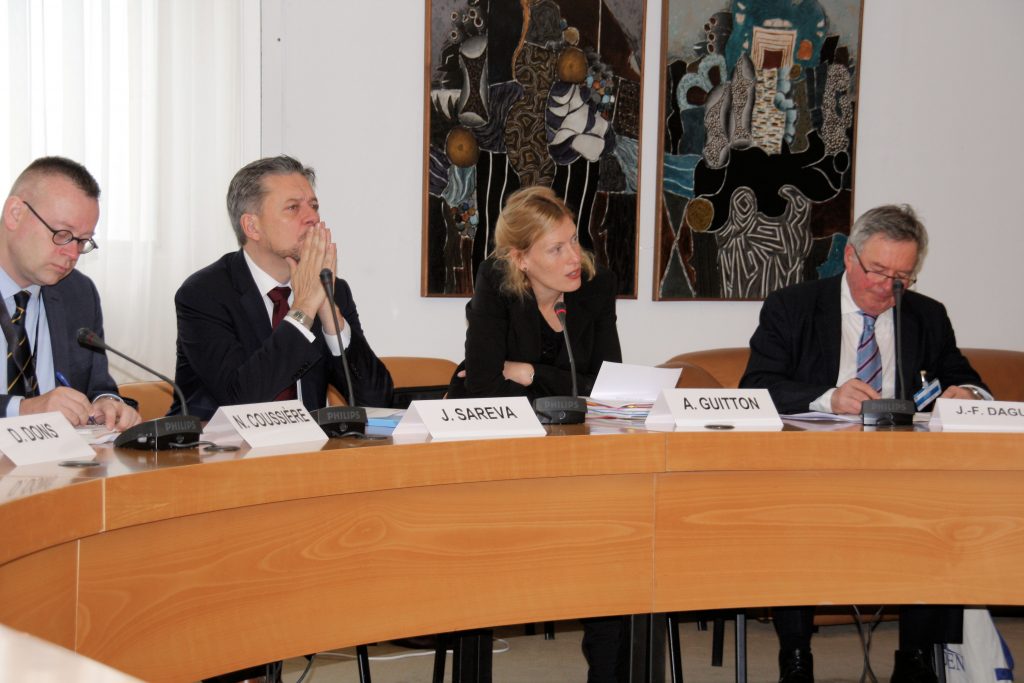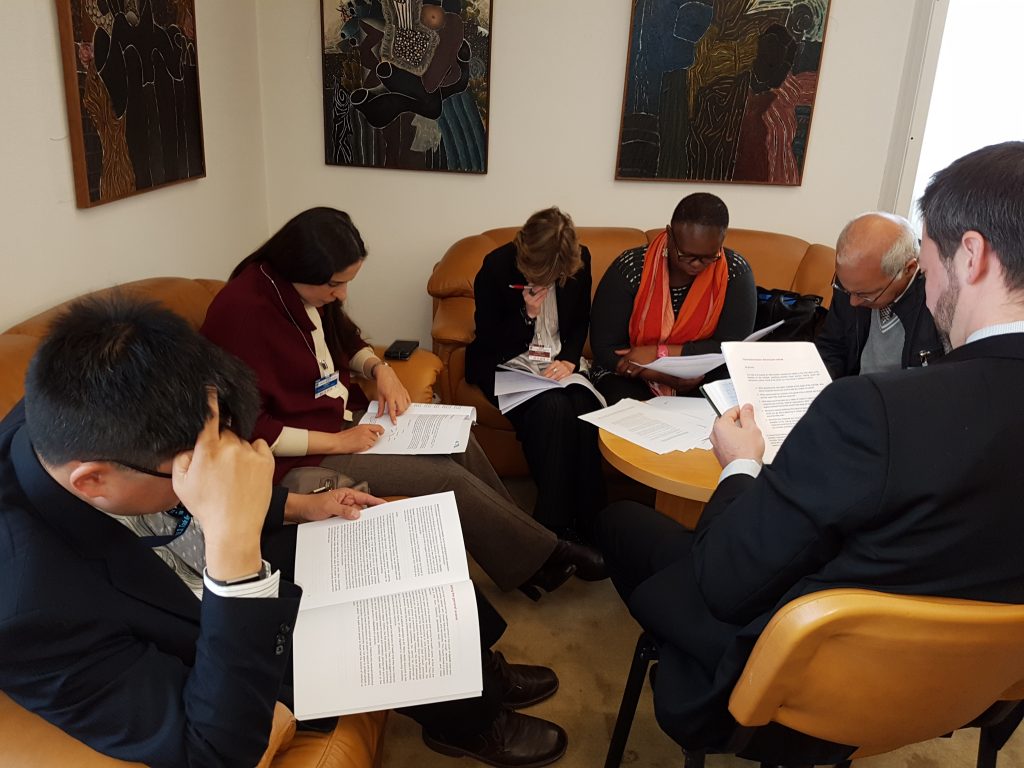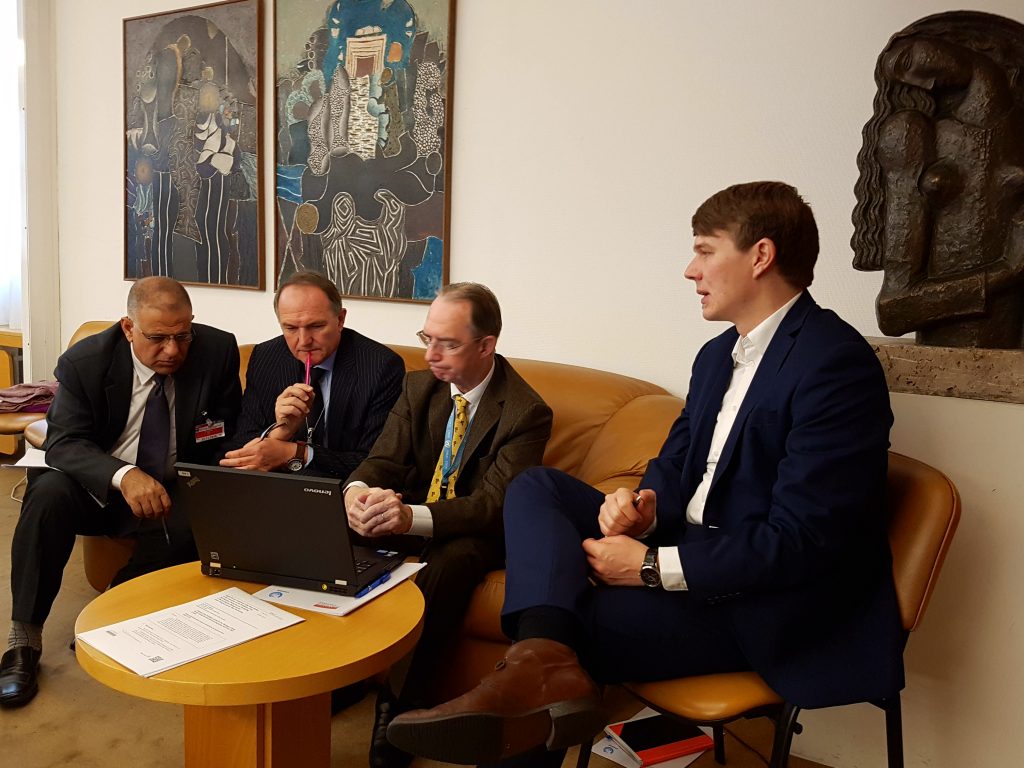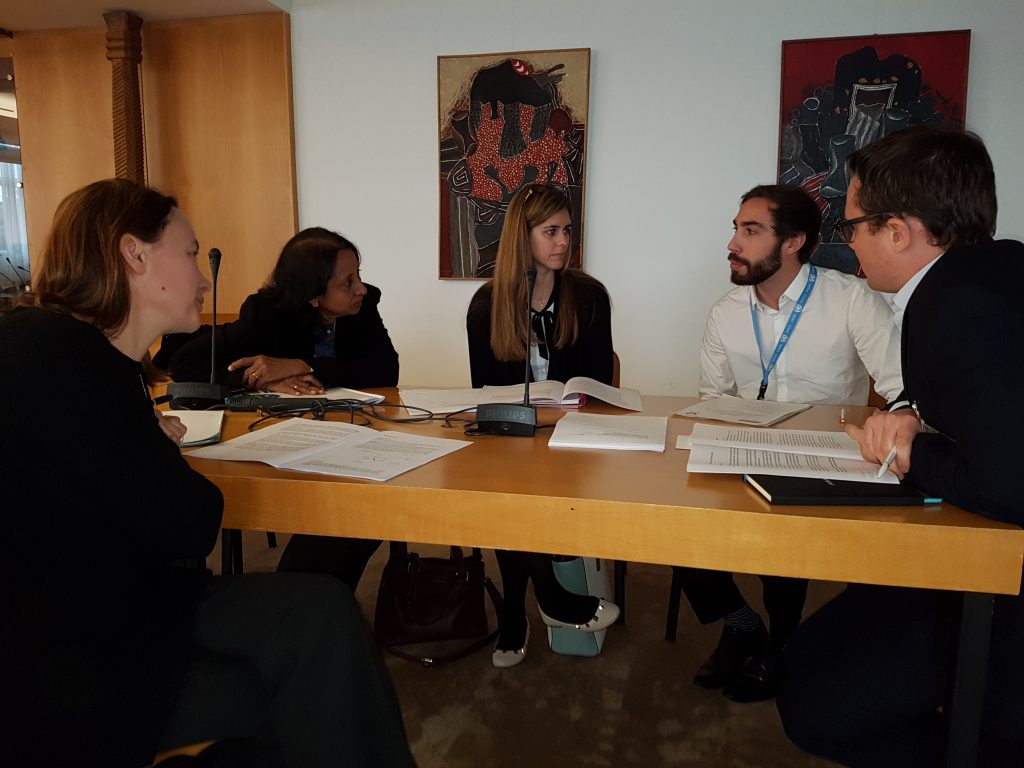Emergency assistance: Triggering Article VII of the BTWC
Tabletop Exercise (TTX) on the Implementation of
Article VII of the Biological and Toxin Weapons Convention (BTWC)
8-9 November 2016, Palais des Nations, Geneva
(Provisional report)
[Prepared by Élisande Nexon, Ralf Trapp and Jean Pascal Zanders]
Article VII of the Biological and Toxin Weapons Convention (BTWC) provides that:
Each State Party to this Convention undertakes to provide or support assistance, in accordance with the United Nations Charter, to any Party to the Convention which so requests, if the Security Council decides that such Party has been exposed to danger as a result of violation of the Convention.
In recent years, considerations such as emergence and re-emergence of diseases, including Ebola, or the use of chemical weapons in Syria, have highlighted challenges pertaining to public health and assistance facing the international community. Many lessons have in the meantime been learned. The Eighth Review Conference gives the international community the opportunity to consider the potential contribution of Article VII to those considerations.

To this end the Fondation pour la recherche stratégique (FRS) and the United Nations Institute for Disarmament Research (UNIDIR) convened a workshop on 8 and 9 November 2016. The primary goal of the exercise was to stimulate reflection on the decision-making processes both within a BTWC State Party and by the international institutions that may become involved if Article VII were to be activated. It also aimed to identify issues that require further study and clarification.
The workshop benefited from financial support by France and the UK Foreign and Commonwealth Office. Twenty-six national representatives and experts from civil society organisations, including public health and disarmament experts, participated in the exercise.
Fostering discussion on the implementation of Article VII: General framework of the tabletop exercise
The exercise enabled participants to exchange views based on a scenario involving a pneumonic plague outbreak in several locations. All victims had been exposed to the same genetically-modified strain displaying enhanced antibiotic resistance. The circumstances aroused suspicion about possible deliberate release. The scenario covered only the timeframe between the detection of an outbreak and the moment when the international community would be called upon under Article VII of the BTWC to offer assistance to the country suffering a major outbreak.
The exercise comprised three breakout sessions. In each session the plot advanced to the next stage of major decision-making by governments. Workshop participants were instructed not to play the scenario, but to consider themselves as a committee of government officials that has to assess alternative policy options and make a final recommendation to the minister. Participants split into three groups, each one representing a different perspective, namely that of the country in which the outbreak was first noticed, the neighbouring country suspected of being the perpetrator of the attack, and a nearby neutral country that might conceivably become an assistance provider.
The exercise was designed to examine specifically in which ways the BTWC as a disarmament and security treaty could contribute to mitigating a (suspected deliberate) outbreak in addition to other international assistance mechanisms. It factored in the current lack of procedures or mechanisms for its implementation.
This synthesis aims at underlining the main conclusions reached and questions raised during the tabletop exercise.
Phase 1: Assessing the outbreak
In the opening stage in the scenario, officials faced an unusual public health situation, but deliberate release is not yet suspected.

All participants therefore viewed response and assistance through a public health lens irrespective of the country they represented. There was an emphasis on national responsibility for assistance, risk assessment, preparedness and coordination with international organisations, with a leading role for ministries of Health. The obvious approach at international level would be to rely on the World Health Organisation (WHO) and the International Health Regulations (IHR, 2005), or possibly the Office for the Coordination of Humanitarian Affairs (OCHA).
Participants emphasised emergency response. Striving for efficiency, they considered options in view of available information to swiftly address public health challenges. They excluded steps with no clear benefits or that could hinder collaborative approaches.
In this context, they did not discern any grounds to invoke Article VII. Some participants also pointed to the lack of clear procedures for triggering Article VII as a major drawback in a context when speed is of the essence.
In the rapidly unfolding health crisis, it would probably have proved too difficult to ascertain in a short timeframe whether the outbreak resulted from a deliberate release. At this stage taking the BTWC framework into consideration in the decision-making process proved difficult. The absence of clear procedures on how to trigger Article VII and absent a clear view of how the provision could offer additional benefits reinforced this assessment. Furthermore, participants deemed it plausible that confirmation of the deliberate nature of the outbreak could be considerably delayed, even arriving after containment of the outbreak. This raised the question of the benefits of invoking Article VII at a later stage. Yet, in such a situation, assistance could still address such issues as strengthening a weakened public health system, decontamination and site remediation, or any other measures aimed at full recovery.
Phase 2: Developing policy action – contingencies
In the second stage suspicion grew that the outbreak might have been deliberate. However, firm confirmation was still lacking.
In this context, all breakout groups made reference to the desirability of investigating the reported incidents, usually with reference to the UN Secretary-General’s mechanism to investigate alleged use of biological weapons (UNSGM), to clarify whether they had been deliberate, and if so, to establish, if possible, the origin of the released agent. Such an investigation almost became a precondition for considering triggering Article VII. Participants however stressed that in an emergency situation, all channels of assistance must be pursued irrespective of a decision by the UN Security Council (UNSC).

It was however underlined that, while the exact nature of the outbreak (deliberate or natural) is not confirmed, activating Article VII can in itself be viewed as an implicit accusation. In this perspective, providing assistance through the BWC could equate to endorsing this allegation and taking sides in a conflict. In the absence of confirmation, be it by a UNSGM investigation or by a determination by the UNSC, participants felt that invoking Article VII may be counterproductive as it pre-supposes a hostile attack when this has not yet been clearly established. This could politicise the situation and the assistance operations planned or under way, thereby significantly complicating the provision of humanitarian assistance. There was therefore a general feeling that the provisions of article VII are relevant only when there is a confirmation of a violation of the Convention.
An issue that came up during the discussions was whether a State alleging that biological weapon was used might request through Article VII assistance with its national investigation into the nature and origin of the outbreak. There was a broadly shared view that providing assistance and facilitating the investigation should preferably be done on a multilateral basis. This did not preclude bilateral initiatives. Besides, even after receiving a request through Article VII, a country may opt to channel assistance through other existing mechanisms.
Discussions highlighted key difficulties pertaining to the request for assistance. The question of to whom it should be addressed was raised. Additional questions pertained to what would be expected from the recipient and the exact nature of the mechanism under the Convention. The content of the request is also of importance, with the issue of whether or not, and how to characterise the suspected attack, as it would go much further than merely drawing attention to a violation of the BTWC. The request could include elements such as information about the outbreak that led to an assistance request, the types of assistance required, including ones going beyond public health assistance, as well as a statement that such assistance would not duplicate efforts already underway as part of the public health response coordinated by WHO. The consequences for the State Party once it has sent the request should also be clarified, especially in terms of coordination of the response.
Phase 3: Exploring matters further
Impact of the deliberate factor on the response
Understanding how the fact that an outbreak resulted from a deliberate release would alter the response process and impact on the way international organisations such as WHO may be involved is a key element. This element was discussed among experts during the TTX. Considering the notion of continuum between natural events and deliberate ones, it is worth noting that, while there might be a technical continuum, especially during the early stages, it is far from granted that there would be a political one. Biological weapon use would indeed constitute an act of war involving an illicit weapon, which may shift the political focus away from a routine public health response paradigm towards a different type of action by the State that felt under attack.
State parties agreed at past Review Conferences that, “in view of the humanitarian imperative, pending consideration of a decision by the Security Council, timely emergency assistance could be provided by States Parties, if requested.” However, TTX participants, whatever role they played, felt that in view of its political consequences the violation of the Convention had to be proven before Article VII could be invoked.
An investigation of such an allegation could be a lengthy process during which State Parties may be reluctant to invoke Article VII. As a consequence, any emergency response under the BTWC would most probably be severely delayed and meanwhile States would resort to other available mechanisms and procedures.
With regard to a slow-moving disease (e.g., anthrax) rather than a sudden and fast-spreading outbreak, the scale of the crisis and the possibility of a deliberate release may not be immediately apparent, making it more difficult to invoke Article VII in a timely way.

The crux on the matter is thus evidence and the level of proof required to confirm a violation of the BWC and the use of biological weapons. It raises the question of the threshold for activating Article VII. At the international level, deciding what would constitute sufficient proof is the prerogative of the UNSC, but it was pointed out during the exercise that, at a national level, this would be a political decision that takes a range of factors into consideration (i.g., evidence and scientific findings, intelligence, political information, elements of context). From the perspective of the victim country, political considerations irrespective of the scientific threshold could inform the triggering of Article VII.
According to participants, dealing with plant and animal pathogens would not alter significantly the response process: first, national response, followed by assistance, and, should an investigation identify deliberate intent, then the BTWC might be called upon. The World Organisation for Animal Health (OIE) and/or the Food and Agriculture Organisation (FAO) would be involved because of the resulting food security issues.
Considering different types of assistance
The scenario allowed to explore further the types of assistance that could be required under article VII. Regarding those that could be envisaged under Article VII, but which could reach far beyond what would normally fall under the scope of humanitarian assistance, the following possibilities were advanced:
- Medical and protective equipment
- Capacity building of local staff for emergency response
- Strengthening of laboratory capacities
- Non-medical aid such as water and food
- Decontamination
- Bio-forensics and the application of the chain of custody procedures
- Veterinary / phytosanitary assistance
- Long-term recovery means to address economic, social, and medical needs
- Military assistance, intelligence cooperation and law enforcement (depending on the context of the event).
Some participants expressed the view that some of the above suggestions could be implemented via Article X of the BTWC on international cooperation.
Besides, as some channels exist that have already been tested for humanitarian assistance, some States might consider the possibility of using Article VII as a vehicle for funding disarmament related actions or investigation of allegations.
Implementing other provisions of the BWC
Considering other provisions of the BWC that States Parties may consider using in such a crisis, there was general agreement among participants that the consultation mechanisms under Article V could be a useful tool. Article VI could be used as well, as it might lead to a determination by the UNSC that a violation of the BWC had taken place. That determination could then establish a trigger for the application of Article VII assistance provisions. However, other participants felt that a State Party may also approach the UNSC directly under Article VII, without first bringing the matter to the UNSC under Article VI.
However, during the exercise none of the breakout groups considered the use of either Article V or VI appropriate in the context of the scenario, the delays in view of the emergency being a prime consideration.
Next steps
This exercise showed the interest of such an approach to foster discussions among experts. The results underline the value of follow-on exercises to explore in greater depth specific issues uncovered during this TTX. These would require the involvement of a broader range of stakeholders extending beyond public health and disarmament experts. Future exercises should also take existing capacities in States into consideration in order to gain a better understanding of specific requirements by State Parties.
[Note: The full report will be published in the week of 21 November 2016.]
